Intro
Nifedipine treats hypertension, angina, and cardiac conditions, offering benefits like lowered blood pressure, improved heart health, and reduced chest pain through its calcium channel blocker properties.
Nifedipine is a medication that has been widely used for several decades to treat various cardiovascular conditions. It belongs to a class of drugs known as calcium channel blockers, which work by relaxing the muscles of the heart and blood vessels. This relaxation effect helps to improve blood flow and reduce blood pressure, making it an effective treatment for conditions such as high blood pressure, angina, and certain types of arrhythmias.
The importance of nifedipine lies in its ability to provide relief from symptoms and improve quality of life for individuals suffering from these conditions. By reducing blood pressure and improving blood flow, nifedipine can help to prevent complications such as heart attack, stroke, and kidney damage. Additionally, nifedipine has been shown to be effective in reducing the frequency and severity of angina attacks, allowing individuals to engage in daily activities with greater ease and comfort.
As with any medication, it is essential to understand the uses and benefits of nifedipine, as well as its potential side effects and interactions. This article will provide an in-depth look at the uses and benefits of nifedipine, including its mechanism of action, dosing, and potential interactions. By understanding how nifedipine works and how it can be used to improve cardiovascular health, individuals can make informed decisions about their treatment options and work with their healthcare providers to develop an effective treatment plan.
Nifedipine Mechanism of Action
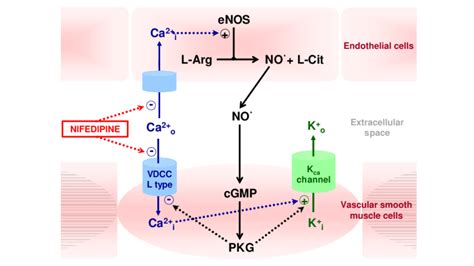
The mechanism of action of nifedipine is complex and involves several different pathways. At the molecular level, nifedipine binds to specific receptors on the surface of smooth muscle cells, blocking the influx of calcium ions and preventing the muscle from contracting. This blockade also helps to reduce the production of certain chemicals that can constrict blood vessels and increase blood pressure.
Nifedipine Uses
Nifedipine is used to treat a variety of cardiovascular conditions, including: * High blood pressure * Angina * Certain types of arrhythmias * Raynaud's disease * Pulmonary hypertension Nifedipine can be used alone or in combination with other medications to achieve optimal results. The dosage and frequency of nifedipine will depend on the specific condition being treated and the individual's response to the medication.Nifedipine Benefits

Nifedipine Side Effects
Like all medications, nifedipine can cause side effects in some individuals. Some of the most common side effects include: * Headache * Dizziness * Lightheadedness * Nausea * Fatigue * Swelling of the feet and ankles It is essential to discuss any concerns or side effects with a healthcare provider, as they can help to determine the best course of treatment and minimize the risk of complications.Nifedipine Interactions
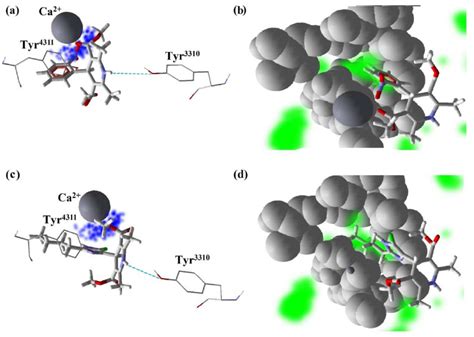
Nifedipine Dosage
The dosage of nifedipine will depend on the specific condition being treated and the individual's response to the medication. Typical dosages range from 10-60 mg per day, taken in divided doses. It is essential to follow the dosage instructions provided by a healthcare provider and not to exceed the recommended dose.Nifedipine Precautions
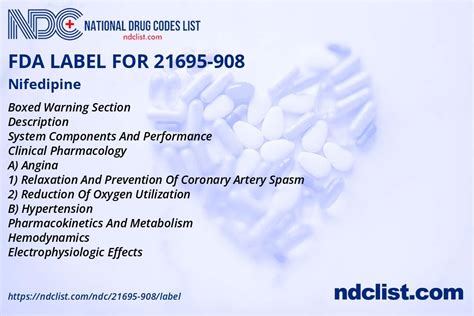
Nifedipine Contraindications
Nifedipine is contraindicated in certain individuals, including: * Those with a history of heart failure * Those with a history of liver or kidney disease * Those taking certain medications, such as beta blockers or digoxin * Pregnant or breastfeeding women It is essential to discuss any concerns or contraindications with a healthcare provider, as they can help to determine the best course of treatment and minimize the risk of complications.Nifedipine Warnings
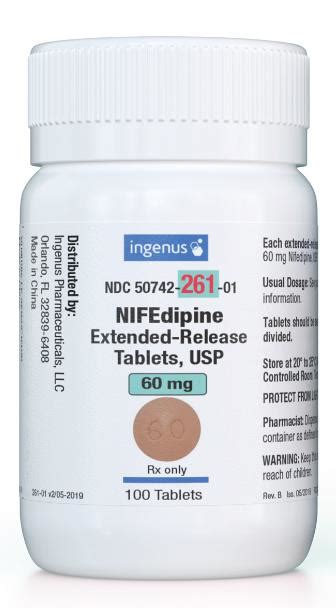
Nifedipine Pregnancy and Breastfeeding
Nifedipine is contraindicated in pregnant and breastfeeding women, as it can cause serious side effects in the fetus or baby. It is essential to discuss any concerns or questions with a healthcare provider, as they can help to determine the best course of treatment and minimize the risk of complications.Nifedipine Storage and Disposal
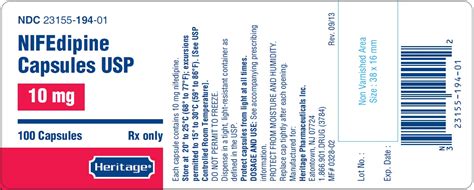
Nifedipine Patient Counseling
Patient counseling is essential when taking nifedipine, as it can help to minimize the risk of complications and ensure optimal results. Patients should be counseled on the following: * Dosage instructions * Potential side effects * Interactions with other medications * Precautions and contraindications * Storage and disposal instructionsWhat is nifedipine used for?
+Nifedipine is used to treat high blood pressure, angina, and certain types of arrhythmias.
What are the benefits of nifedipine?
+The benefits of nifedipine include reduced blood pressure, improved blood flow, and reduced angina symptoms.
What are the potential side effects of nifedipine?
+The potential side effects of nifedipine include headache, dizziness, lightheadedness, nausea, and fatigue.
Can nifedipine be used in combination with other medications?
+Yes, nifedipine can be used in combination with other medications, but it is essential to discuss any interactions with a healthcare provider.
What are the precautions and contraindications of nifedipine?
+The precautions and contraindications of nifedipine include hypotension, edema, and gastrointestinal problems, and it is contraindicated in individuals with a history of heart failure, liver or kidney disease, and pregnant or breastfeeding women.
In final thoughts, nifedipine is a valuable medication for the treatment of various cardiovascular conditions. By understanding its uses, benefits, and potential side effects, individuals can work with their healthcare providers to develop an effective treatment plan and minimize the risk of complications. If you have any questions or concerns about nifedipine, please do not hesitate to comment or share this article with others. Additionally, if you have experience with nifedipine, please share your story to help others understand the benefits and potential side effects of this medication.
